Proctors theater... and power plant, trash collection, and internet service
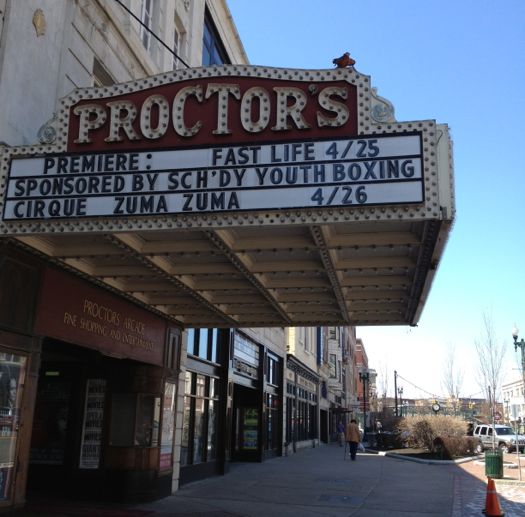
An old Vaudeville theater that hosts Broadway road shows like Wicked and Book of Mormon, plus films, comedy, and music is easy to write about. There's glitz, there's glamour, there's history. It's sexy.
A district energy plant that heats and cools businesses along a city block -- less sexy.
OK, but what if the same place also collects trash? And sells internet and phone service? And hosts Broadway touring companies, films, comedy and music performances.
Then it's Proctors.
When you pass by the Schenectady theater and arts hub, here are a few interesting things that you won't see on the surface.
An energy cooperative
In addition to running Broadway-style shows and arts programming, Proctors runs a district energy system that heats and cools its own building, the nearby Hampton Inn, and Center City across the street.
Proctors' system is powered by natural gas and heats water to distribute for heating. Waste heat from the system is used to create cooling. The system is currently heating and cooling about one million square feet, and has the capacity to cover about three million square feet within two blocks in downtown Schenectady.
"We installed four 60 kilowatt microturbines -- 240 kilowatt -- they are tied to a hot water absorber which takes the waste heat and creates cooling with it so we add both cooling capacity and electric capacity," explains Proctors CEO Philip Morris, who gave us a tour of the system last week.
As Morris mentioned, the system is also capable of generating electrical power. Not a lot of power -- just enough to be used as a back-up to get Proctors through a show in the event of a power outage -- but it could also add to their cooling capacity. But after five years, Proctors is still unable to use the system for more regular power generation due to an issue with National Grid. Morris says it appears a resolution is coming soon.
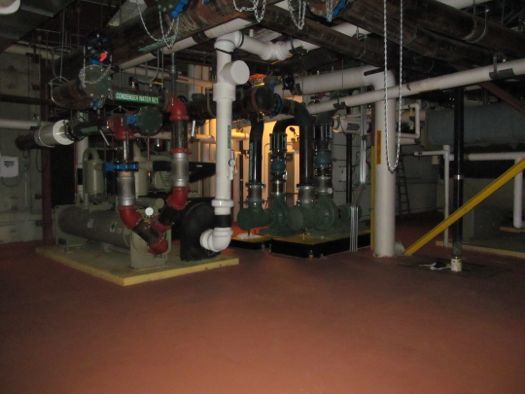
Saving money and carbon
The businesses connected to Proctors system pay based on their usage, their peak on and off times, and maintenance. Morris estimates it saves Proctors and the other businesses involved between 15 and 20 percent a year on heating and cooling costs. Each customer is also saving money by not having to build its own heating and cooling systems (nor, down the road, junking an old system for a new). Center City, says Morris, saved over a million dollars, primarily in capital costs for equipment, by not having to build its own plant.
According to Morris the district heating and cooling system also reduces the carbon footprint for downtown businesses -- saving 45 pounds, or "three bowling balls," of carbon each hour.
The Proctors system has two boilers and two chillers, for both redundancy and efficiency. "When it's 40 degrees out, maybe only one is running. When it's zero, maybe they're both running," Morris explains.
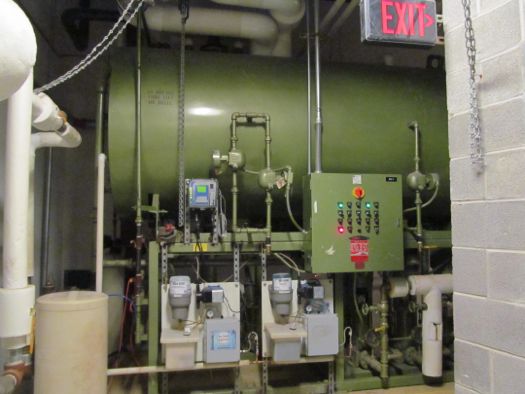
District energy isn't new. A centralized steam system was established in Manhattan in the late 1800s, and ConEd now provides steam to large portions of the city. (The Proctors system uses hot water instead of steam.)
Morris points out there are a number of district energy systems in place around the US, but they mostly serves colleges, where a central plant heats and cools buildings throughout the campus. But since Superstorm Sandy, says Morris, New York State has exhibited renewed interest in district energy systems.
"The state is pushing very hard for district energy because with centralized energy distributed over monstrous networks -- thousands and thousands of people are at risk for one mistake or one bad day or whatever, and some district energy is a way to mitigate that risk," he says.
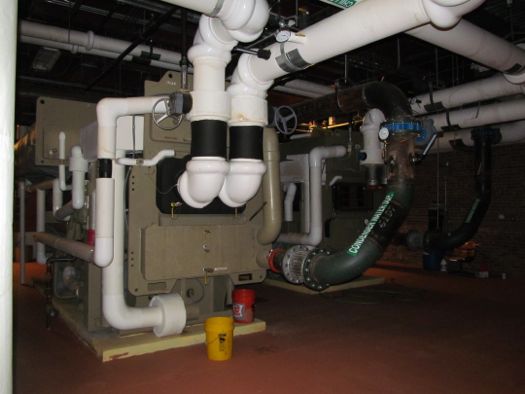
Re-envisioning the role of a cultural center
So why does a theater and cultural center get involved in providing heat and cooling?
It started more than nine years ago, when Schenectady and Metroplex were looking for solutions to a deteriorating downtown.
"The most important thing to remember is how low Schenectady had gotten," Morris says. " Ninety percent of downtown was vacant. Wholesale change was required."
Morris says local officials and property owners were open to all kinds of options to encourage development. So he tossed out an idea he'd heard learned about years earlier, when he was a member of the Jamestown City Council -- a district energy plant. "If we can provide our neighbors affordable energy at a consistent price -- that's one of the biggest issues to owning property and developing property."
They requested a NYSERDA study, which reported that pretty much every property in the downtown area would need new heating and cooling systems. That would involve huge capital costs for all of those buildings. So, without a single client committed, Proctors took a gamble and built the system, providing a different option for those buildings.
It now has three clients and would like to add more -- the system has the capacity to heat and cool three times the square footage it's currently serving. Proctors also uses the system to provide sidewalk snow melting for all the businesses on its block, which saves Proctors alone $50,000 a year in insurance costs.
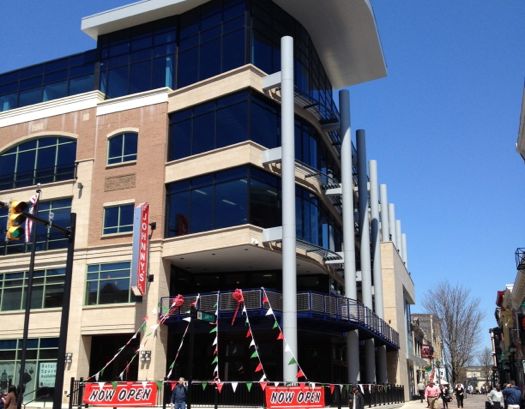
The Center City complex doesn't have its own heating system, it is heated and cooled by Proctors district energy stystem.
"We don't think of ourselves as a utility," says Morris, "We think of ourselves as a neighborhood support structure. It runs like a cooperative. We meet once a year, we talk about problems, our customers will call us up with problems and we'll go over and help them."
As the administrator, Proctors handles all of the maintenance for the system. "We have a lot of pipe underground that, if it failed, would be a disaster. And eventually it will fail --it's inevitable -- so as the administrator you have to keep up on all that stuff," he says. "Soon we'll hire a company to come and use fiber optic photography and go in all the pipes and see what they look like. But if we had our own systems we'd have to do the same thing. It costs more but not by multiples that are painful. We would have had a steam operator -- now we have one and a half steam operators. We would have had some type of engineering consultancy, but it was worth getting a half time in-house engineer. It cost more but other people are helping to pay for it."
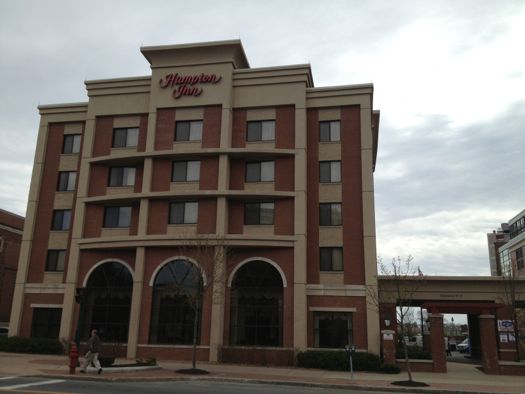
Proctors also handles other things you wouldn't expect an arts org to do -- like trash collection for its city block.
"When Hampton Inn was trying to get their approval from the city planning commission one of the problems was that in order to accommodate all the garbage containers they needed, they were below minimum threshold of parking for their licensing from the Hampton franchise," says Morris. After talking with developers and business owners on the block, they decided to put a trash compactor on a piece of land that belongs in part to Proctors and in part to The Hampton. The compactor is used by the whole block and allows The Hampton the extra parking it needs.
Proctors has now agreed to collect trash for the entire block. "Our neighbors pay us -- and they pay us less than they would pay someone else... and we actually make a few pennies," says Morris. "It's no skin off our teeth to become a trash collector because we are going to collect trash anyway. We're gonna do it. So now we can do it better for ourselves because of the compaction smaller footprint."
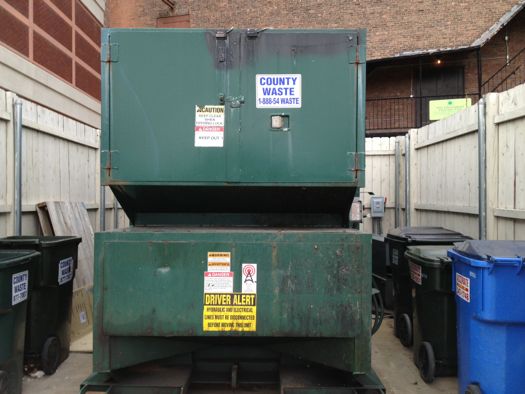
Proctors does something similar with internet and phone service. It paid for high speed fiber and provides internet and voice-over-IP for its downtown tenants at a rate it guarantees for ten years.
As a theater, Morris says, Proctors is unique in providing theses sorts of cooperative services. But ee says a few other theaters in the country have been looking at them as a potential model.
"What it comes down to," says Morris, "is we are cultural facilities managers. And if you're a facilities manager, you are going to have internet, telephone, waste, heating -- and allocating that service to others becomes not that big a deal. We're a theater -- we're a building. A building needs heat and cooling and if we supply it to three others it's not that big a leap."
It may not be that much of a logistical leap, but it's kind of a philosophical leap to imagine an arts organization providing these types of services to keep costs low for neighbors, make a little extra money, and improve the area. Then again, isn't improving a region part of the mission of an arts organization?
"It's an interesting integration of economic development, community development, public policy, cultural development," says Morris. "It just speaks to an unusual alliance of forces that's part of your community's redevelopment."
Proctors has advertised on AOA.
Hi there. Comments have been closed for this item. Still have something to say? Contact us.
Comments
Great example of some creative and productive cooperation. Are you listening, Albany?
... said Bob on Apr 25, 2013 at 11:18 AM | link
What a great article. Very interesting!
... said Jason on Apr 25, 2013 at 12:40 PM | link
I can think of a bunch of downtowns that could benefit from this.
... said Justin on Apr 25, 2013 at 1:17 PM | link
Great article Pretty neat stuff!
I wish they would remove smoking station from the front of the building and shoo away the riff raff. The front vestibule smells like urine and stale cig smoke ALL Of the time.
... said Howard on Apr 25, 2013 at 1:45 PM | link